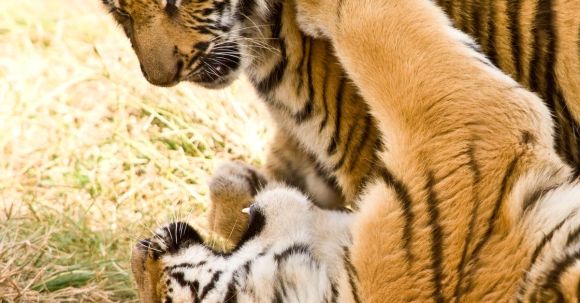Animals engage in play behavior across various species, from mammals to birds and even reptiles. Play may seem like a trivial activity, but it serves a crucial role in the development and socialization of animals. This article will explore the significance of play in animal behavior, shedding light on its various functions and benefits.
Promoting Physical Fitness and Skill Acquisition
One of the primary functions of play in animal behavior is to promote physical fitness and skill acquisition. Young animals, in particular, engage in play as a means to develop their motor skills, coordination, and agility. For example, young cubs playfully wrestle with their siblings, helping them refine their hunting techniques and coordination. Similarly, dolphins engage in acrobatic displays, enhancing their swimming abilities and agility.
Building Social Bonds and Communication Skills
Play also plays a crucial role in building social bonds and honing communication skills among animals. By interacting in a playful manner, animals develop trust and familiarity with one another. For instance, wolves engage in playful chasing and wrestling, strengthening their pack cohesion and social hierarchy. Playful interactions also allow animals to practice and refine their communication skills, such as body language and vocalizations.
Reducing Stress and Enhancing Emotional Well-being
Just like humans, animals experience stress and emotions. Play serves as a natural stress reliever and contributes to the emotional well-being of animals. Engaging in playful activities triggers the release of endorphins, which promote feelings of pleasure and happiness. This helps animals cope with stressful situations and maintain a positive mental state. For example, primates engage in playful behaviors like chasing and tickling, which help them alleviate stress and establish social bonds within their groups.
Developing Problem-Solving and Cognitive Abilities
Playful activities also contribute to the development of problem-solving and cognitive abilities in animals. Through play, animals engage in exploratory behaviors, allowing them to learn about their environment and develop problem-solving skills. For instance, young chimpanzees engage in playfully manipulating objects, honing their abilities to use tools in the future. Play also stimulates brain development and enhances cognitive functions, ultimately improving an animal’s adaptability and survival skills.
Preparing for Adult Roles and Reproductive Success
Play behavior in animals often serves as a way to prepare for adult roles and reproductive success. For example, young male lions engage in playful sparring matches, which mimic the behaviors they will need as they mature and compete for dominance. Play also allows animals to practice courtship rituals and mating behaviors, ensuring reproductive success in the future. By engaging in play, animals learn the necessary skills and behaviors that will be crucial for their survival and reproductive fitness.
Conclusion: The Importance of Play in Animal Behavior
Play is not a trivial activity but serves a vital role in animal behavior. It promotes physical fitness, skill acquisition, and the development of social bonds. Play also reduces stress, enhances emotional well-being, and contributes to cognitive development. Additionally, it prepares animals for adult roles and reproductive success. Understanding the significance of play in animal behavior can provide valuable insights into their evolutionary adaptations and highlight the importance of providing opportunities for play in captive environments.





